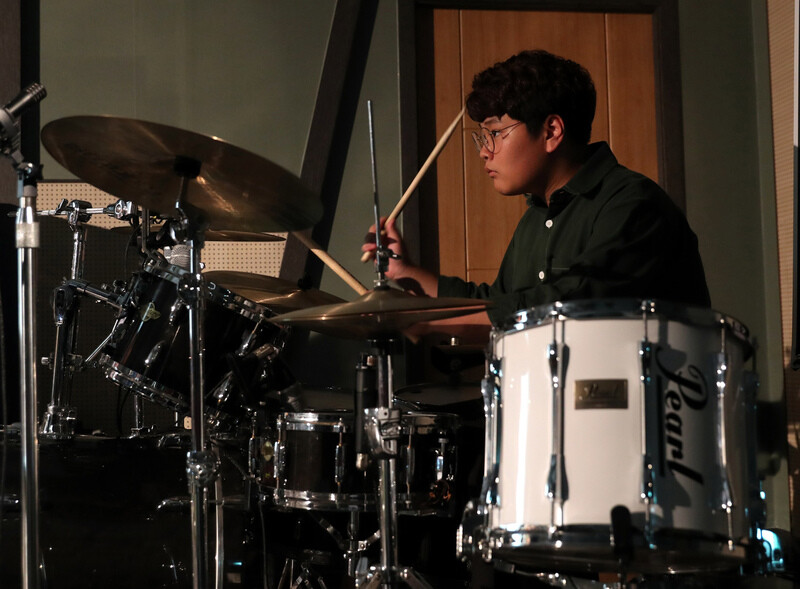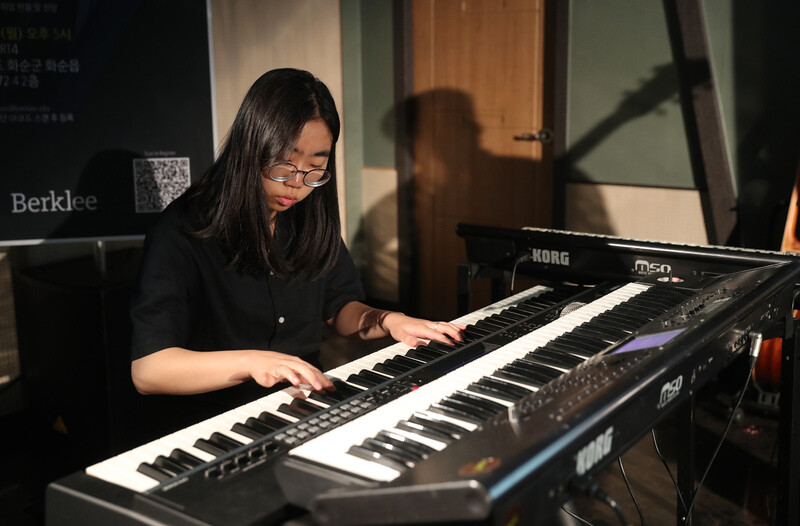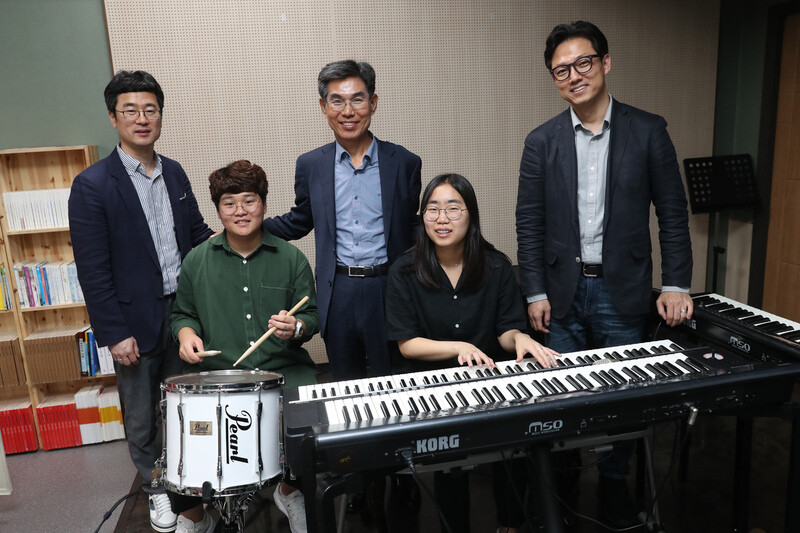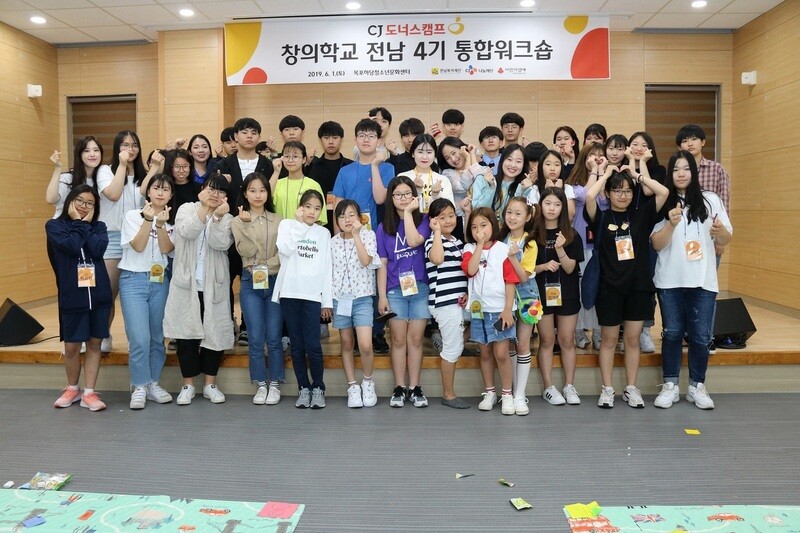hankyoreh
Links to other country sites 다른 나라 사이트 링크
[Reportage] South Jeolla Province fosters arts and culture programs for talented youth

“I just thought I would give it a shot. I never imagined I would pass. I was so happy I cried.”
Speaking to the Hankyoreh on June 10 at Art4, an applied music education institution in Hwasun County, South Jeolla Province, 16-year-old Jeong Gyeol blushed as she recalled the moment she received a notice in late March that she had been accepted into the Berklee College of Music. Jeong auditioned for the college’s piano department in Tokyo back in mid-February. The notification stated that she would first have to complete a Music and English Intensive Program (MEIP) to work on her still-halting English abilities – but it was for all intents and purposes an official admission letter. The Berklee College of Music is an elite institution, world-recognized in the area of contemporary applied music.
Shin Won-ju, who is one year younger at 15, took part in the same audition and was praised by the judges for his ability to play the drums. But he did not receive an official acceptance because of his young age. Tim H. Lee, Berklee’s associate director of international recruitment, visited Art4 that day while in South Korea from Boston to meet with Gyeol and Won-ju. Lee said that both of them “showed abilities and gifts far beyond other children of similar ages.”
“In Won-ju’s case, his admission notification was only put off because he’s so young. If he auditions again, the outcome will be positive,” he predicted.
“In contrast with classical music and its set framework, contemporary applied music places more importance on freedom and creativity,” Lee explained.
“In the US as well, the truly talented applied musicians tend to come from outside of the major cities,” he added.

Many South Koreans believe that success in music requires instruction from a famous teacher at excellent facilities in Seoul or another major city. The cost of such an education tends to be quite steep. But Gyeol and Won-ju live in Hwasun, a small county of around 60,000 people in South Jeolla Province. Neither has any experience with instruction from a big-city music academy or instructor. What allowed them to get noticed by the Berklee College of Music was a combination of their own talent and passion and the assistance of a local government and business arts support program.
Gyeol first sat down in front of a piano at the age of seven. As a second-year middle school student in 2017, she quit school because she “loved music so much.” Since then, she has focused entirely on studying music. Jeong Hoe-su, the 43-year-old director of Art4, has been a rock to Gyeol as both her father and teacher. He too is a musician, having studied the guitar.
Explaining that she likes “songs that are fast and fun,” Gyeol said, “I’d like to be a jazz pianist like [noted Japanese female prodigy] Hiromi Uehara.”
Drummer Won-ju also quit school as a second-year middle school in December 2018 because he “felt like I was wasting time there.” In March of this year, he entered the applied music department at Honam Theological University and Seminary. He was granted special admission last year after placing first in drumming at a competition held by the university. Won-ju explained that he is “based in drums but work[s] with a variety of instruments,” sharing his ambitions of “making my own kind of music.” He and two other Art4 students are currently planning to take part in another Berklee audition scheduled to take place in Seoul this November. Art4 is currently working to nurture dreams with around 30 young music-lovers like Gyeol and Won-ju.

Art4 established as after-school program for underprivileged students
Established in 2011 by Jeong Hoe-su, Art4 was commissioned to operate a local elementary, middle, and high school afterschool program and a community-linked, publicly supported culture program. Since the second half of 2017, it assumed the reins for the popular music class under the CJ Donors Camp Creative School South Jeolla program, launched by the Jeonnam Welfare Foundation with support from the CJ Group. Popular music classes are held every Saturday and are free of charge for students.
The students’ skills have steadily grown thanks to instruction by professional mentors, whose rental and teaching fees are provided by Creative School South Jeolla. From beginners who were only able to play sheet music for existing songs, students have reached a level where they can compose their own music and lyrics. For Gyeol, a big boost came last year when she received training for the first time from a piano professor at Honam Theological University and Seminary in Gwangju.
“Gyeol, Won-ju, and two other students formed an ensemble that played four original compositions for the first time in late 2017, and in February of last year Gyeol and another student were selected as band school members for an SBS talent scouting team,” Jeong Hoe-su said.
“None of that would have been possible without the support of Creative School South Jeolla,” he added.
Gyeol also finished as runner-up in the teenagers’ division at a Yongin Jazz Festival competition held by the Yongin Cultural Foundation last November. Competing against university students, she won the grand prize in a CBS national applied music competition this year. Her success has brought gestures of support from the local community. The Hawsun Office of Education designated Art4 as a “Hwasun art school,” while the county government is providing assistance for the “Dream Orchestra” project.
Creative School South Jeolla is a social welfare program designed to provide assistance for young people in the province who boast talent and aptitude in different areas of culture – but whose families are struggling financially – to achieve their dreams. It was launched in the second half of 2017 in the three areas of popular music, theater, and Korean music (gugak). As of this year, the program period has been extended from six months to one year, and the program has been broadened to the four areas of film, cooking, musical theater, and Korean music. One unique aspect of the program is that it has different regional bases for its different areas: Mokpo for film, Muan for cooking, Naju for musical theater, and Gwangyang for Korean music.
“This year, there have been 88 young people taking part in Creative School South Jeolla from within the province, ranging from the fourth year of elementary school to the third year of high school,” said Gwak Dae-seok, president of the Jeonnam Welfare Foundation, which operates Creative School South Jeolla.
“Over 40% of those selected come from marginalized backgrounds,” Gwak added.
South Korean Prime Minister Lee Nak-yeon was one of the major contributors to Creative School South Jeolla’s emergence. During his time as governor of South Jeolla Province, Lee had emphasized “educational welfare,” setting the aim of “creating stories of success from humble origins in South Jeolla.” He instructed the Jeonnam Welfare Foundation to make the Creative School South Korea program into one of its centerpiece efforts. But he was not around to witness the school’s official launch, having been appointed prime minister under President Moon Jae-in. His successor, current governor Kim Yeong-rok, has also been generous with support.
South Jeolla has highest rates of youth outflow in S. Korea
“Among all of South Korea’s local government, South Jeolla has the most serious rate of youth outflow,” explained Gwak Dae-seok. “It’s a vicious cycle where the loss of young people leads to a decrease in the productive population, declining production capabilities, and poverty.”
“As governor, Kim Young-rok’s conviction is that talented professionals must be nurtured through educational programs like Creative School South Jeolla,” he added.
Another major part of Creative School South Jeolla is the support it receives from the CJ Group. For the past three years, CJ has been contributing 200 million won (US$168,666) annually to the program. The support is not only financial; the group has also been generous with different forms of assistance including sharing operational knowledge for the school, training university student mentors to serve as instructors, and providing facilities for student workshops. In 2005, CJ established the CJ Welfare Foundation, which has been carrying out various educational support efforts ever since.

Poverty should not be passed on to children via educational inequality
“Based on the philosophy that poverty should not been passed down to children through educational inequality, we are involved in various social contribution programs including study room support for marginalized young children and adolescents,” explained Lee Yong-gwon, the foundation’s secretary-general. CJ also provided financial support when Gyeol and Won-ju auditioned for Berklee.
The figure who brought South Jeolla and CJ together was Gwak Dae-surk. An expert in social welfare, Gwak has served as director of the Social Welfare Council’s Social Contribution Information Center and secretary-general of the CJ Welfare Foundation. It was Gwak who proposed the Creative School idea to South Jeolla when the province was looking for concrete welfare program ideas in late 2016, around the time he had just become president of the Jeonnam Welfare Foundation.
Ultimately, Creative School South Jeolla’s success in nurturing musical talents owes itself to a combination of the local government’s educational welfare philosophy, corporate support, and efforts by welfare and education experts within the region. The Jeonnam Welfare Foundation plans to increase the Creative School program’s scope provide support to even more local talents.
“There’s a student at one middle school in Jangseong, South Jeolla, who finally ended up moving to Hwasun County early this month because it was so difficult for her to ride the bus for two hours every Saturday to go to Art4,” said Gwak.
“We’re planning to create distinct culture schools in South Jeolla’s 22 cities and counties to help more young people achieve their dreams,” he added. Gwak is also looking for an abandoned school site to establish an integrated culture school in Naju, which is located in the center of South Jeolla.
By Kwack Jung-soo, business correspondent
Please direct comments or questions to [english@hani.co.kr]

Editorial・opinion
![[Column] Park Geun-hye déjà vu in Yoon Suk-yeol [Column] Park Geun-hye déjà vu in Yoon Suk-yeol](https://flexible.img.hani.co.kr/flexible/normal/500/300/imgdb/original/2024/0424/651713945113788.jpg) [Column] Park Geun-hye déjà vu in Yoon Suk-yeol
[Column] Park Geun-hye déjà vu in Yoon Suk-yeol![[Editorial] New weight of N. Korea’s nuclear threats makes dialogue all the more urgent [Editorial] New weight of N. Korea’s nuclear threats makes dialogue all the more urgent](https://flexible.img.hani.co.kr/flexible/normal/500/300/imgdb/original/2024/0424/7317139454662664.jpg) [Editorial] New weight of N. Korea’s nuclear threats makes dialogue all the more urgent
[Editorial] New weight of N. Korea’s nuclear threats makes dialogue all the more urgent- [Guest essay] The real reason Korea’s new right wants to dub Rhee a founding father
- [Column] ‘Choson’: Is it time we start referring to N. Korea in its own terms?
- [Editorial] Japan’s rewriting of history with Korea has gone too far
- [Column] The president’s questionable capacity for dialogue
- [Column] Are chaebol firms just pizza pies for families to divvy up as they please?
- [Column] Has Korea, too, crossed the Rubicon on China?
- [Correspondent’s column] In Japan’s alliance with US, echoes of its past alliances with UK
- [Editorial] Does Yoon think the Korean public is wrong?
Most viewed articles
- 1[Column] Park Geun-hye déjà vu in Yoon Suk-yeol
- 2N. Korean hackers breached 10 defense contractors in South for months, police say
- 3Thursday to mark start of resignations by senior doctors amid standoff with government
- 4[Editorial] New weight of N. Korea’s nuclear threats makes dialogue all the more urgent
- 5Kim Jong-un expressed ‘satisfaction’ with nuclear counterstrike drill directed at South
- 6Will NewJeans end up collateral damage in internal feud at K-pop juggernaut Hybe?
- 7[Editorial] Japan’s rewriting of history with Korea has gone too far
- 8[Cine feature] A new shift in the Korean film investment and distribution market
- 9[Column] ‘Choson’: Is it time we start referring to N. Korea in its own terms?
- 10[Column] The clock is ticking for Korea’s first lady